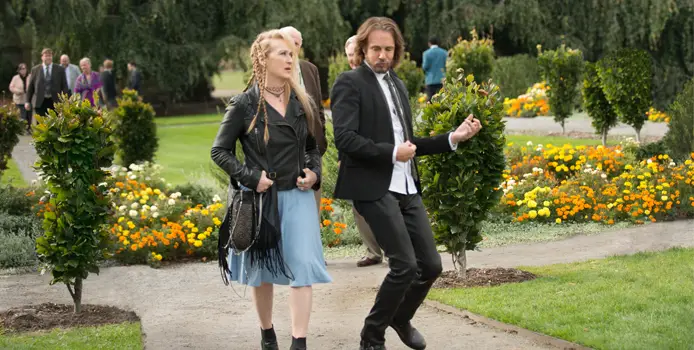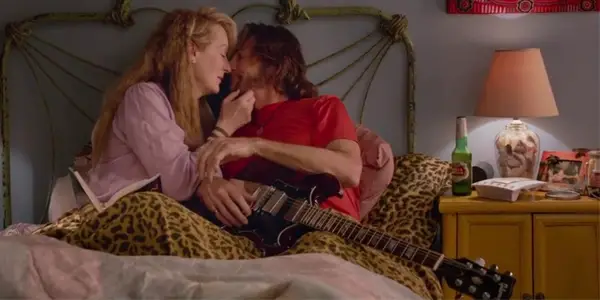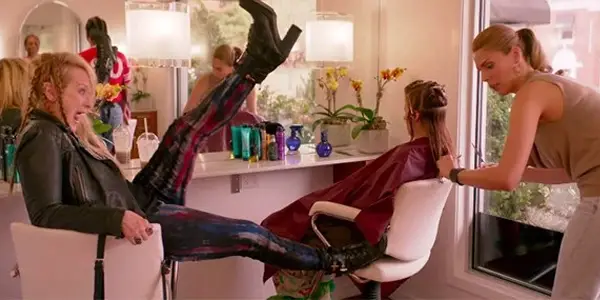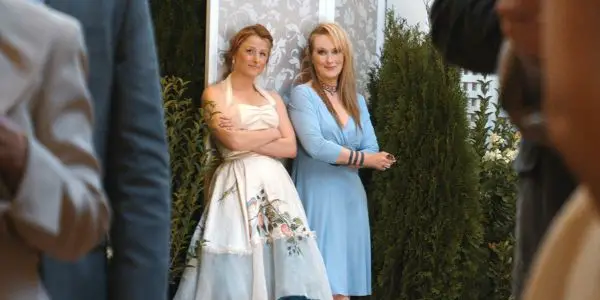RICKI AND THE FLASH: Streep Saves Another Messy Film

Alex is a 28 year-old West Australian who has a…
To put it bluntly, Ricki and the Flash is a film which feels unfinished. It’s not a poorly made film, everyone involved seems to be at least putting in some effort, it’s just that between the script and overall editing, large chunks of the film seem to be missing and the film feels like it doesn’t deliver a full story. This is quite surprising, as the cast and crew behind the film are quite talented. It as directed by Jonathon Demme, a great “actor” director, most famous for his Oscar-winning direction of The Silence of the Lambs; produced and scripted by indie favourite Diablo Cody, who rose to mainstream fame with Oscar winning Juno, followed by a slew of critical misfires, including Jennifer’s Body and Paradise, which was her directorial debut.
Between these two alone, one should expect a great, quirky film, and with talent that includes Meryl Streep and Kevin Kline, it’s a sad disappointment that the film ends up feeling flat.
I Still Haven’t Found What I’m Looking For
Ricki and the Flash tells the story of Ricki Rendazzo (Meryl Streep), a.k.a. Linda to the people who actually know her. She is the lead singer for the traditional rock band Ricki and the Flash, with lead guitarist Greg (Rick Springfield of “Jessie’s Girl” fame) who constantly pines for her affections, and a group of supporting musicians that the film doesn’t feel like introducing. They are the house band for a low-rent local bar, where Ricki jumps between that and a cashier at a vegan retail store, which pays poorly and she is often harassed by her overtly pretentious manager.

Ricki’s quiet existence is shaken when her ex-husband Pete (the always great Kevin Kline) requests her to come back home, as their daughter (Mamie Gummer, real life daughter of Streep) has just broken up with her husband and is suicidal. She must return to the family she abandoned to achieve her rock dreams, and confront the problems she initially ran away from.
The story setup is quite a predictable one, with the unpredictable outside force coming into a situation which requires abstract methods to solve (think of it as the Mary Poppins formula). Whilst it does follow a quite predictable route for its first half, it cuts through all the tropes that we’ve seen before quite quickly. When Pete’s current wife Maureen (Audra McDonald) comes back and after confronting Ricki about her past, orders her back where she came from and the film becomes about Ricki’s reaction to her brief return to her past, forcing her to actually shake up her new current life up a bit, which mainly consists of a rushed montage and more extended musical performances.
Bad Romance
The most interesting part of the story’s plotting is that the film completely lacks a second act. Traditional storytelling, especially in a mainstream friendly movie like this, tells us that a film should have three acts: setup, action, climax. The film’s structure feels more like two different films edited together, with the first act lazily spilling into the third act. The film’s setup features all the classic setups and character introductions, we get a decent starting point for this story to be told. But the problem is, when the halfway point kicks in and Ricki is forced to go back home, the film meanders and loses its plot progression, rushing a lot of character beats until it decides it’s time to run into its climax, which, a big surprise, is set on a wedding, the romcom cliche of the century. In the middle of this, at least some of our characters should transform or fulfill some form of character arc, so that the film’s journey should have meaning to the characters, which creates engaging cinema for the audience.

Ricki and the Flash has no character arcs for any of its characters. Ricki never grows up or develops fully as a character, and I never got the sense that she grew or developed as a person in any significant way. Kevin Kline’s Pete is seemingly discarded halfway through the film. The story of Ricki’s suicidal daughter is pushed into the background and given no resolution and Ricki’s romantic partner Greg is given one role in the film which is to please and love Ricki throughout the film and he never does anything outside of it. When the film doesn’t seem to care about how each character progresses and what their importance to Ricki is, it creates a disconnect to the audience. I stopped caring about anyone on-screen, as they were slowly picked off by poor script-writing, like a lazy horror film, in order to focus on Ricki and her long scenes of pure rock-playing which felt indulgent after the first 20 minutes.
Let’s Work Together
Diablo Cody is a writer who with Juno came out with a distinct style of writing: sarcastic people who are surrounded by a cast of eclectic characters as they try to navigate themselves towards some form of personal redemption and growth. Her stylised dialogue became her calling card and the element of her scripts that people always pointed out, which is most evident in Juno and her television works (such as United States of Tara). With Ricki and the Flash, her style is much more restrained, with a much more traditional style of writing being used, characters relating to each other with standard dialogue, with the witty sarcastic remarks being limited to Ricki’s daughter, the distraught Julie, who frequently throws out the tactless insults and societal observations that seem to be very similar of Cody’s past works.
The film seems surprising for fans of Cody’s works, with her previous feature film effort, Young Adult, being a subvert of the typical rom-com style, going for a more bleaker and realistic take on the overused genre, whilst this film feels much more regular and voice-less, feeling like a writer-for-hire work rather than a passionate screenplay. The odd plotting and severe underwriting for most of its characters feels lazy overall, which seems strange for Cody.

Jonathon Demme is a great director and one that can demand strong performances from his actors, displayed in previous films like Silence of the Lambs, Melvin and Howard and Rachel Getting Married. His talent is still evident here, with Meryl Streep giving some life to Ricki, which elevates the underwriting of her character, injecting her with subtle ticks and a sense of playfulness which makes watching her character enjoyable and makes her bad decisions she’s made seem redeemable. Kevin Kline is quite restrained in the film and ultimately underused for such a talented comedic actor (2013’s Last Vegas showed that Kline’s still got his keen comedic timing) and Rick Springfield surprisingly gives a satisfying performance, not sticking out like a sore thumb which can happen with musician to actor transitions on-screen.
Demme’s visual direction is lacking overall though, with the cinematography being standard two-camera setup affairs, with a large emphasis on close-ups which can feel tiresome after a while. Extended scenes of Ricki and the Flash playing different covers (including Pink and Lady Gaga) start to feel protracted after a while, with large chunks of screen-time devoted to these concert times which really detract from the main plot line, which really deserved more time to flesh out its characters. These make sense due to Demme’s history with music documentaries, such as the famous Talking Heads concert movie Stop Making Sense and his Neil Young shows, but overall these scenes should’ve been severely cut down to help give time to the film’s other problems.
The Verdict
Sadly, with the amount of talent attached to the picture, Ricki and the Flash is a film which severely underuses its cast and premise, rushing towards a predictable climax in a film filled with expected tropes. It’s a film which drives on emotion, putting more effort in trying to entertain and uplift its audience with standard mainstream fare, sacrificing any form of coherent linear storytelling and satisfying character arcs, in order to devote more screen-time to the indulgent and overly long musical segments. This makes the film feel like a lazy musical.
Between Demme’s safe direction and Cody’s restrained script, this is a film saved by its acting talent, who do a good job of elevating the film’s lack of detail. This film may entertain people looking for nothing deep, something to pop on the television whilst in the background, but in terms of serious cinema viewing, the film is a letdown and ultimately a disappointment.
Do you think pure emotional impact is more important than crafting an entertaining story and characters in cinema?
Ricki and the Flash is already being screened all over the world, but there are still a few countries awaiting release. For international release dates, check here.
(top image source: TriStar Pictures)
Does content like this matter to you?
Become a Member and support film journalism. Unlock access to all of Film Inquiry`s great articles. Join a community of like-minded readers who are passionate about cinema - get access to our private members Network, give back to independent filmmakers, and more.













